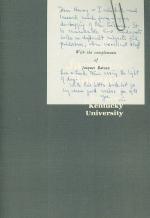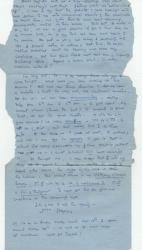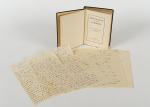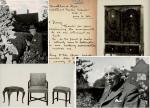12. Levy, Arthur Joseph / Zangwill, Israel.
Archive / Collection of more than 350 items, letters, documents, ephemera, pamphlets, manuscript notes, receipts , manuscript letters from the private library of Providence (Rhode Island) lawyer, Arthur (Art) Joseph Levy. The collection includes an important, controversial typescript-essay (8 pages) on Israel Zangwill’s address before the American Jewish Congress at Carnegie Hall on October 14th, 1923 (″Watchmen, what of the Night ?”); with manuscript annotations and remarks on Israel Zangwill’s position “the hopes of Jewry for the establishment of a Jewish State in Palestine are doomed to disappointment”. The collection includes a plethora of interesting letterheads of jewish organizations and also important documentation of Levy’s contribution to and support for the “Palestine Foundation Fund”, (receipt from Boston, Mass. June 1923). Levy, who was a graduate of Brown and Boston University Law School, practiced law in Providence, Rhode Island and led an active life as a member and leader of several Jewish civic organizations, such as the Jewish Family and Children’s Service, which he established and led for twenty years, Rhode Island Jewish Historical Society, the Temple Beth-El Brotherhood, the Miriam Hospital, the Touro Fraternal Association and the Jewish Home for the Aged of Rhode Island. He was also a prominent member of the American Bar Association, the Brown University Alumni Association and the Brown Club of Rhode Island. Highly regarded as a jurist, he was a member of the Commission to Consolidate State Laws, a member of the Advisory Committee of the Federal Tax Institute of New England and an editor of the Rhode Island Bar Journal. Included in this archive are a group of letters written during World War I discussing his role in the Jewish Welfare Board of the United States Army and Navy, an invitation to a fund-raising dinner for the Jewish Orphanage of Rhode Island, a group of documents and letters discussing the establishment of a Jewish country club in Providence, several documents from the early 1920s concerning the mostly Jewish fraternity Phi Epsilon Pi and several items relating to Levy’s personal life, such as personal letters, bills from clothiers and invitations to social events. (Main source of the description of this archive is the research of our colleague Greg Talbot from The Lawbook Exchange).
Providence (Rhode Island), Cambridge (Massachusetts), New York, 1917 – 1931. Octavo and A4. Two heavy folders with original documents. Very good condition with only minor signs of external wear.







![Archive of Naval Captain, Lieutenant commander [LCDR] William Hamilton Porter Jr.'s Love Letters / Lucky BAg with American Football - Baseball Images and artwork by Howard Chandler Christy](/images/thumbnails/29748AB.jpg)










